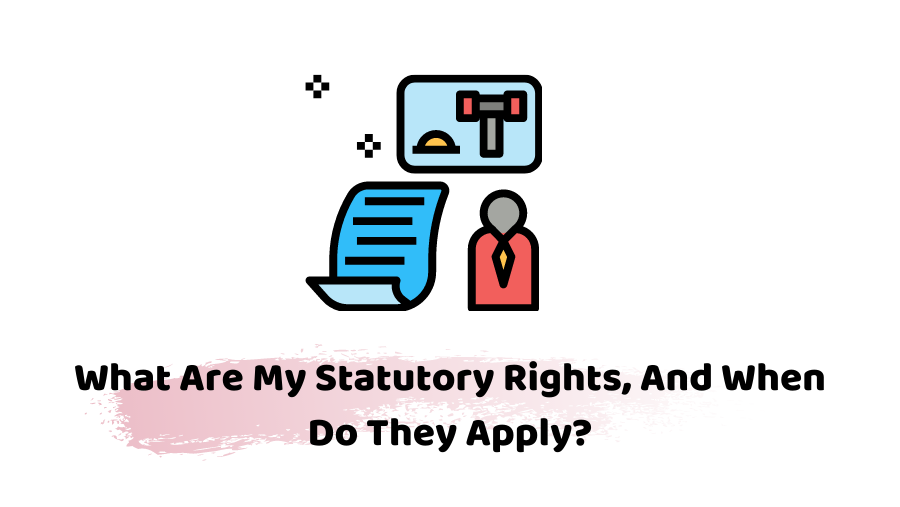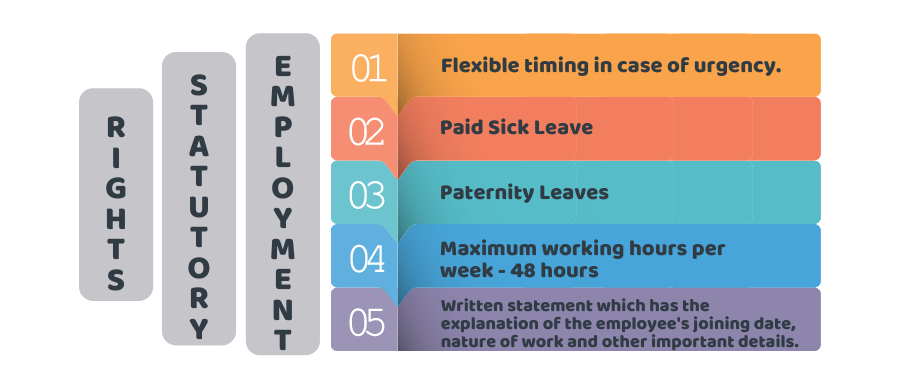The relationship between an Employer and employees requires two ways to meet each other’s expectations. This post will demonstrate to maintain the balance for employment statutory rights between what an Employer expects from his employees and vice versa. Also, we will cover when these rights apply.
In some of the cases, statutory rights can only be claimed after a certain time period and individuals have spent time with the company.
This includes:
60 Days:
- Sick leave with pay
- Notice period before termination
- Layoff payments
Six Months:
- Maternity leave
- Paid Paternity leave
- Flexible working rights
- Adoption leaves
Two years:
- Lay-off payments
- Notice period before redundancy
Every Employee has Statutory Rights – but what are they?
If we focus on defining rights in the simplest way, we can say rights that belong to an individual by law, nature, or tradition. Whereas, statutory rights are based on statutes or specific laws passed by the federal, state, and local Government. This include:
- Workplace Safety
- Equal Employment Opportunities
- Collective Bargaining
Furthermore, the employers have the right to hire, fire, demote or promote unless there is a law of contract to the contrary. On the other hand, the employee has the right to quit and cash a better opportunity under the same constraints.
Learn more about employment Rights with Accotax!
Examples of Employee Statutory Rights:
Some basic rights belong to every employee regardless of the nature of work. Even if an individual has signed the contract or an agreement to agree to terms and policies, there are some basic rights that no one can snatch from an employee.
Employment rights are to protect the employer and the employee and in case of misconduct, both parties can seek a solution with the help of law.
Here are some basic statutory rights for employees.
- Flexible timings in case of urgency.
- Paid sick leave
- Paternity Leaves
- Maximum working hours per week – 48.
- A written statement which has the explanation of the employee’s joining date, nature of work, and other important details.
The implication of Statutory Rights:
UK Law provides maximum protection to the employees through certain statutory rights. The implications differ from one case to another according to the nature of the work.
This depends upon two main components which are listed below.
- Wages
- A number of employees work for a company.
The moment an individual starts working for a firm regardless of time. It could be a part-time job or a full-time job, the statutory rights get implemented.
Business Consequences:
Any business entity, owner or employee is liable for Employment statutory rights. The management must ensure the rights to be fulfilled in a professional manner. Employers should take guidance in this regard, from a solicitor to avoid unjust circumstances.
In case the owner is found guilty of violating any of the employee’s laws, the employee can quit the job instantly or claim for violating rules. The rest of the part will be between civil courts and the employer might face ugly results of violation like imprisonment or heavy fines.
Save your energies and instantly talk to our Advisory to avoid harsh circumstances.
The Right Guide:
The single way goes to blind trust in this regard is to wisely rely on experts and professionals of this field. There are many law practitioners under the UK legal councils who offer their services and bring ease for smooth processing for you.
Accotax offers services through legal experts, contact now!
Conclusion:
To conclude, we can say that it is very important to be aware of your statutory rights regardless of your nature of work. You could be a newly hired employee or an employer who is a decade old in the business world. The awareness of these rights keeps it all grounded and safe.























































